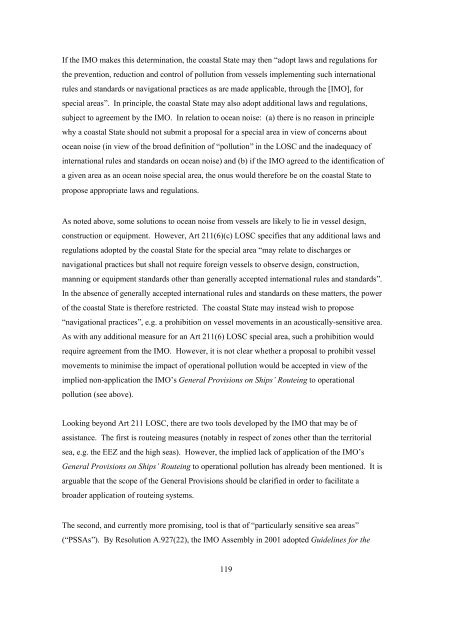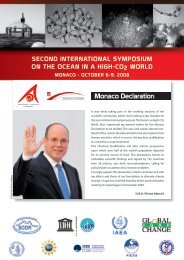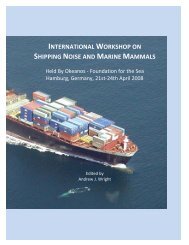If the IMO makes this determination, the coastal State may then “adopt laws <strong>and</strong> regulations forthe prevention, reduction <strong>and</strong> control <strong>of</strong> pollution from vessels implementing such internationalrules <strong>and</strong> st<strong>and</strong>ards or navigational practices as are made applicable, through the [IMO], forspecial areas”. In principle, the coastal State may also adopt additional laws <strong>and</strong> regulations,subject to agreement by the IMO. In relation to ocean <strong>noise</strong>: (a) there is no reason in principlewhy a coastal State should not submit a proposal for a special area in view <strong>of</strong> concerns aboutocean <strong>noise</strong> (in view <strong>of</strong> the broad definition <strong>of</strong> “pollution” in the LOSC <strong>and</strong> the inadequacy <strong>of</strong>international rules <strong>and</strong> st<strong>and</strong>ards on ocean <strong>noise</strong>) <strong>and</strong> (b) if the IMO agreed to the identification <strong>of</strong>a given area as an ocean <strong>noise</strong> special area, the onus would therefore be on the coastal State topropose appropriate laws <strong>and</strong> regulations.As noted above, some solutions to ocean <strong>noise</strong> from vessels are likely to lie in vessel design,construction or equipment. However, Art 211(6)(c) LOSC specifies that any additional laws <strong>and</strong>regulations adopted by the coastal State for the special area “may relate to discharges ornavigational practices but shall not require foreign vessels to observe design, construction,manning or equipment st<strong>and</strong>ards other than generally accepted international rules <strong>and</strong> st<strong>and</strong>ards”.In the absence <strong>of</strong> generally accepted international rules <strong>and</strong> st<strong>and</strong>ards on these matters, the power<strong>of</strong> the coastal State is therefore restricted. The coastal State may instead wish to propose“navigational practices”, e.g. a prohibition on vessel movements in an acoustically-sensitive area.As with any additional measure for an Art 211(6) LOSC special area, such a prohibition wouldrequire agreement from the IMO. However, it is not clear whether a proposal to prohibit vesselmovements to minimise the impact <strong>of</strong> operational pollution would be accepted in view <strong>of</strong> theimplied non-application the IMO’s General Provisions on Ships’ Routeing to operationalpollution (see above).Looking beyond Art 211 LOSC, there are two tools developed by the IMO that may be <strong>of</strong>assistance. The first is routeing measures (notably in respect <strong>of</strong> zones other than the territorialsea, e.g. the EEZ <strong>and</strong> the high seas). However, the implied lack <strong>of</strong> application <strong>of</strong> the IMO’sGeneral Provisions on Ships’ Routeing to operational pollution has already been mentioned. It isarguable that the scope <strong>of</strong> the General Provisions should be clarified in order to facilitate abroader application <strong>of</strong> routeing systems.The second, <strong>and</strong> currently more promising, tool is that <strong>of</strong> “particularly sensitive sea areas”(“PSSAs”). By Resolution A.927(22), the IMO Assembly in 2001 adopted Guidelines for the119
Identification <strong>and</strong> Designation <strong>of</strong> Particularly Sensitive Sea Areas (“the PSSA Guidelines”). 120The PSSA Guidelines identify <strong>noise</strong> as an operational pollutant from vessels. 121 They define aPSSA as: 122an area that needs special protection through action by IMO because <strong>of</strong> its significance forrecognized ecological, socio-economic, or scientific reasons <strong>and</strong> because it may be vulnerableto damage by international shipping activities.The criteria for the identification <strong>of</strong> a PSSA are laid down in the Guidelines. 123 In order to beidentified as a PSSA, the area in question should meet at least one <strong>of</strong> the listed criteria <strong>and</strong> shouldadditionally “be at risk from international shipping activities”. 124 The listed ecological criteria areuniqueness or rarity, critical habitat, dependency, representativeness, diversity, productivity,spawning or breeding grounds, naturalness, integrity, vulnerability, <strong>and</strong> bio-geographicimportance. 125 In principle, using at least one <strong>of</strong> these criteria, coupled with demonstrating a riskfrom international shipping activities, there is no reason why a State should not submit a proposalfor a PSSA in view <strong>of</strong> concerns about ocean <strong>noise</strong>.However, the question arises as to what may in turn be done to manage a <strong>noise</strong> problem. On thatpoint, the PSSA Guidelines take two approaches. Initially, they state that “associated protectivemeasures for PSSAs are limited to actions within the purview <strong>of</strong> IMO <strong>and</strong> include the followingoptions”, listed as: 1266.1.1 designation <strong>of</strong> an area as a Special Area under Annexes I, II or V, or a SOx emissioncontrol area under Annex VI <strong>of</strong> MARPOL 73/78, or application <strong>of</strong> special discharge120 See Annex 2 to Resolution A.927(22). The PSSA Guidelines are stated to “supersede chapter 3 <strong>of</strong> theAnnex to resolutions A.720(17) <strong>and</strong> A.885(21)”. The annex to Resolution A.720(17) contains Guidelinesfor the Designation <strong>of</strong> Special Areas <strong>and</strong> the Identification <strong>of</strong> Particularly Sensitive Sea Areas, <strong>of</strong> whichchapter 3 addresses PSSAs. Annex I to Resolution A.885(21) contains Procedures for the Identification <strong>of</strong>Particularly Sensitive Sea Areas <strong>and</strong> the Adoption <strong>of</strong> Associated Protective Measures, <strong>of</strong> which chapter 3addresses Application by a Proposing Member Government for Identification <strong>of</strong> a PSSA <strong>and</strong> the Adoption<strong>of</strong> Associated Protective Measures.121 See para 2.2. See also para 1.2.2, para 1.2.11 <strong>and</strong> Table 1 <strong>of</strong> the annex to Resolution A.720(17); theseparts have not been superseded by Resolution A.927(22).122 Para 1.2.123 Section 4.124 Para 4.4. Factors to be taken into consideration in deciding whether the area is “at risk frominternational shipping activities” are listed in section 5.125 Para 4.4.126 Section 6.1.120
- Page 2:
Oceans of Noise 2004A WDCS Science
- Page 8 and 9:
In the US, the deployment of Low Fr
- Page 10 and 11:
its propagation beyond those declar
- Page 12 and 13:
The best evidence for noise being f
- Page 14 and 15:
Box 1. Characteristics of sound / l
- Page 16 and 17:
Sound speed (c)The speed (c) of a w
- Page 18 and 19:
Box 2. The effects of temperature,
- Page 20 and 21:
2.1.2. Measuring sound intensityIde
- Page 22 and 23:
i.e. Equal pressure measurements di
- Page 24 and 25:
Spherical or Geometrical spreading
- Page 28 and 29:
5.0 145Tug pulling loaded barge 1.0
- Page 30 and 31:
The source used during 3-D surveys
- Page 32 and 33:
Machinery noisePropulsion machinery
- Page 34 and 35:
Man-made islands /caissonsFixed pla
- Page 36 and 37:
12 3245Drill bit6Figure 3.4. Sound
- Page 38 and 39:
Transientnoise sourcesAircraftHelic
- Page 40 and 41:
Results from the aerial surveys con
- Page 42 and 43:
haemorrhaging in the inner ears and
- Page 44 and 45:
However they also noted that whales
- Page 46 and 47:
4. The Use of Sound by CetaceansChr
- Page 48 and 49:
seems logical, therefore, that if t
- Page 50 and 51:
However, despite the reported low a
- Page 52 and 53:
Kamminga and Wiersma 1981;Akamatsu
- Page 54 and 55:
SongSocial callsShrieksSlaps0.03-80
- Page 56 and 57:
anthropogenic factors that make the
- Page 58 and 59:
5.3 Longer-term impactsNoise is cle
- Page 60 and 61:
5.4 Indirect impactsThe above impac
- Page 62 and 63:
decompression sickness (DCS) as see
- Page 64 and 65:
6. Examples of regional and nationa
- Page 66 and 67:
6.3 ASCOBANS and ACCOBAMSTwo region
- Page 68 and 69:
implications and the discussion sho
- Page 70 and 71: 7.1. Consideration of Voluntary vs.
- Page 72 and 73: acoustic measurements have been mad
- Page 74 and 75: 7.6. Methods of protectionComplianc
- Page 76 and 77: 7.6.1 Monitoring7.6.1.1 Visual, aco
- Page 78 and 79: Delory et al. (2002) use Ambient No
- Page 80 and 81: 8. ReferencesAburto, A., Rountry, D
- Page 82 and 83: Caldwell, M.C., Caldwell, D.K., and
- Page 84 and 85: Engas, A., Lokkeborg, S., Ona, E. a
- Page 86 and 87: IWC 2002b. Report of the Scientific
- Page 88 and 89: McCauley, R.D. 1994. Seismic Survey
- Page 90 and 91: Potter, J. and Delory, E. 2001. Noi
- Page 92 and 93: Smolker, R.A., Mann, J. and Smuts,
- Page 94 and 95: Watkins, W.A. 1981b. The activities
- Page 96 and 97: ANNEX 1The Application of Marine Po
- Page 98 and 99: an important factor. 13 The judgeme
- Page 100 and 101: in the preparatory work of the LOSC
- Page 102 and 103: practice by the UNEP Governing Coun
- Page 104 and 105: protection and preservation of the
- Page 106 and 107: than international rules, standards
- Page 108 and 109: Four of the twelve regional seas tr
- Page 110 and 111: seismic operations in the Protocol
- Page 112 and 113: ConclusionAt the global level, only
- Page 114 and 115: Art 209 LOSC focuses on both standa
- Page 116 and 117: No State Party may impose condition
- Page 118 and 119: coastal States”. This formulation
- Page 122 and 123: estrictions to vessels operating in
- Page 124 and 125: In the EEZ, in comparison to the te
- Page 126 and 127: Appendix A - Some international ins
- Page 128 and 129: Convention for the Protection of th
- Page 130 and 131: Available at:http://www.unep.ch/sea
- Page 132 and 133: BucharestConventionArticle XIPollut
- Page 134 and 135: environment1. The Contracting Parti
- Page 136 and 137: - that under Article III.8.c) of AC
- Page 138 and 139: e) no sudden or repeated change in
- Page 140 and 141: Ref: Nowacek et al. 2001.Location:
- Page 142 and 143: Location: Arctic• Vocal behaviour
- Page 144 and 145: • Vaquita surfacing duration and
- Page 146 and 147: • 6% of small delphinids (n=264;
- Page 148 and 149: Species type: Boto, Inia geoffrensi
- Page 150 and 151: • Humpback whales appeared tolera
- Page 152 and 153: • Behaviour interpreted as aggres
- Page 154 and 155: • There was no evidence of minke
- Page 156 and 157: • Northern right whales may be ap
- Page 158 and 159: • Migrating gray whales disturbed
- Page 160 and 161: to Ensenada De La Paz, Mexico. Aqua
- Page 162 and 163: distribution of humpback whales, Me
- Page 164 and 165: Richardson, C.R. Greene, C.I. Malme
- Page 166 and 167: Zhou, K., Pilleri, G. and Li, Y. 19
- Page 168 and 169: 6. surveys for Cuvier’s beaked wh




